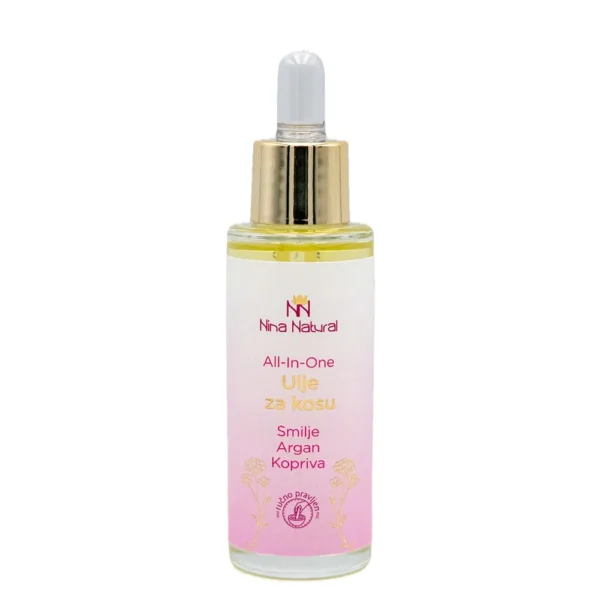Nettle for Lush and Healthy Hair Growth: Myth or Reality?
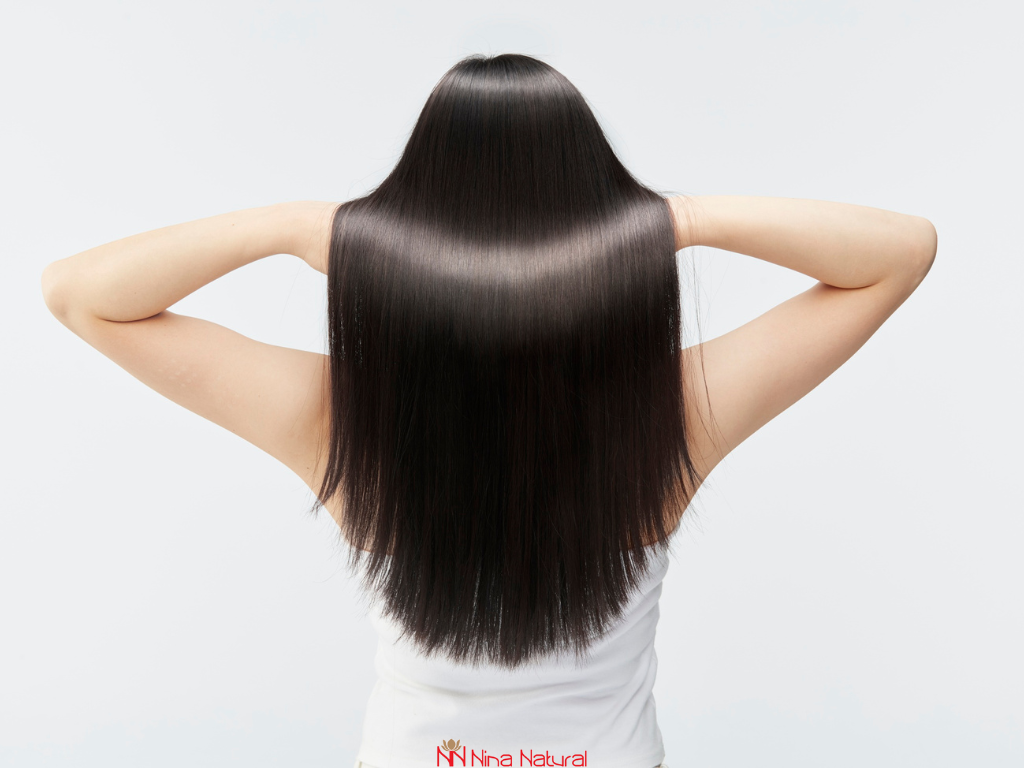
Nettle is rich in vitamins, minerals, and antioxidants, which is why it’s often mentioned as natural support for hair health. But can it really affect hair growth and strength, or is it just a folk belief?
In this article, we analyze what science says about nettle’s composition, how it affects hair follicles, hair strands, and scalp, and what practical methods of use you can start applying at home today.
What is nettle and why is it so associated with hair care?
Urtica dioica, better known as nettle, is a plant with a long history of use in folk medicine. Its popularity in hair care dates back centuries, and today it’s a key ingredient in many cosmetic preparations.
It’s used primarily because of its nutritional richness. Nettle has been used in traditional medicine in many cultures, and only in recent decades has science begun to study its effects in more detail.
Myths and facts: Does nettle really help in hair care?
The answer is clear: yes, but not in the way many people think. Science confirms that it has real benefits that can significantly contribute to the health of hair strands and follicles.
Here are some myths we often hear and the facts behind them:
Myth 1: Nettle is a cure for baldness
Reality: No, nettle is not a cure, and therefore, it doesn’t treat baldness.
However, nettle, whether as a supplement or raw plant, cannot restore hair where follicles are permanently destroyed.
One study, which used keratinocyte cells from skin, examined the theory of whether a mixture of six plant extracts (including nettle, Urtica dioica and Urtica urens) could affect processes related to hair loss, especially through reducing inflammation in follicles.
Nettle (Urtica dioica and Urtica urens) was particularly highlighted for its action on 5α-reductase inhibition (reduces DHT formation) and β-sitosterol content, which may contribute to new hair growth.
Although this study wasn’t conducted on humans but in a laboratory on skin cells, it gives us hope that extracts from these 6 plants (Urtica dioica, root, Urtica urens, leaf, Equisetum arvense, leaf, Achillea millefolium, aerial parts, Matricaria chamomilla, flower, and Ceratonia siliqua, fruit) would give positive results after regular use for a minimum of 3 days.
Myth 2: Nettle prevents gray hair appearance
Reality: Nettle contains antioxidants, but there’s no study proving it can slow down or prevent the process of hair turning gray.
There are indications (patents, theoretical assumptions, antioxidant properties of nettle) suggesting that some components might have such potential, but without concrete experimental data or clinical trials, this remains an unconfirmed claim.
It should be noted that genetics and age are the main factors when it comes to gray hair. This process is genetically and hormonally predetermined, and although antioxidants in nettle may contribute to overall health, they don’t have a direct impact on hair pigmentation.
Myth 3: Nettle makes hair thicker in one month
Reality: No. There isn’t sufficient solid scientific evidence that nettle causes lush hair growth in just 1 month (in humans). There are preliminary results in vitro and ex vivo models showing potential, but these aren’t directly measurable effects in humans under real conditions and in such a short timeframe.
Hair growth is a slow process. Nettle may help reduce scalp oiliness due to tannins, so hair may appear visually lusher, but there’s no evidence that it actually gives hair fullness.
Myth 4: Nettle is an “overhyped folk remedy” for hair
Reality: Nettle is rich in nutrients, and studies have shown that vitamins and minerals in nettle don’t work in isolation but in mutual synergy contribute to creating better conditions for scalp and hair health.
Nettle contains the following vitamins and minerals:
Vitamins: A, C, E, B complex
Minerals: iron, zinc, magnesium
Flavonoids and phenolic acids (antioxidants)
Carotenoids and beta-sitosterol (additional follicle protection)
For the body to “pick up” these nutrients, nettle needs to be consumed in the following forms:
Nettle tea (leaf infusion): good for mineral intake like iron, magnesium, and zinc, but some vitamins (especially C) are lost through heat. Regular consumption is recommended as mild, continuous support.
Fresh leaf or nettle juice: the best way to preserve vitamin C and enzymes. Fresh leaves can be added to smoothies, soup, or juiced. Consuming nettle this way provides the body with the most antioxidants and vitamins.
Oral supplements (capsules/freeze-dried nettle powder): practical way to intake concentrated nutrients, especially if there’s no access to fresh plants. Standardized extracts retain flavonoids, phenolic acids, and beta-sitosterol.
Tincture (alcohol extract): Extracts phenolic acids and flavonoids (antioxidants), but less vitamin C. Suitable for targeted action on circulation and immunity.
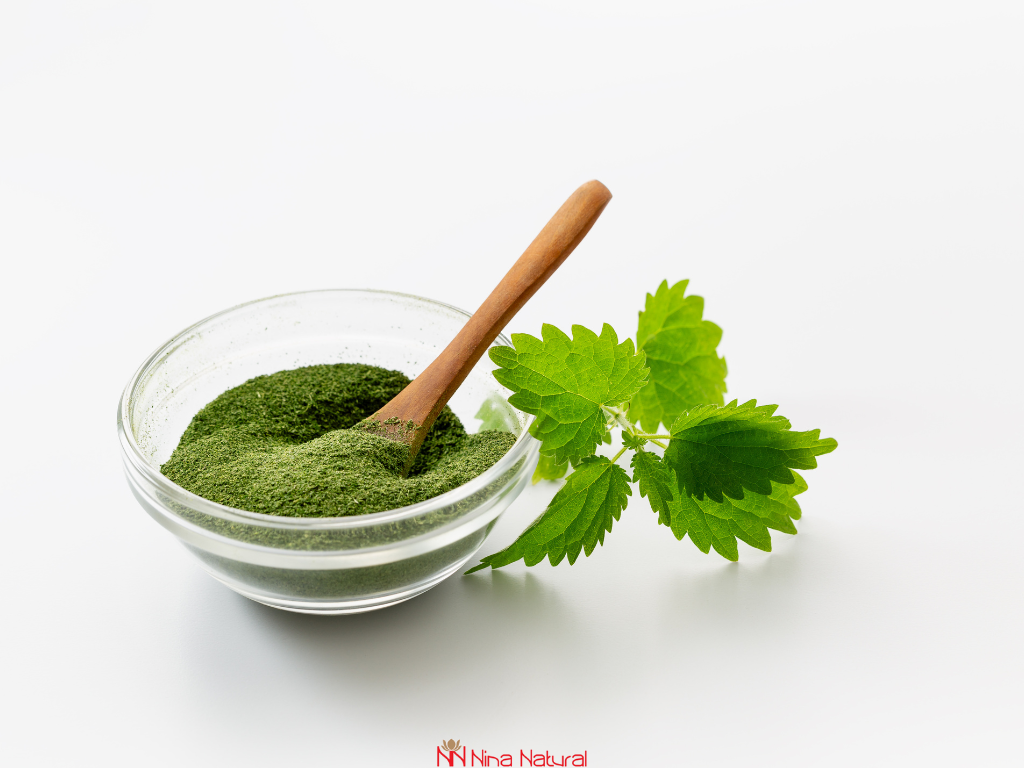
How does nettle, if consumed in the above-mentioned ways, affect our hair?
Improves circulation in the scalp → minerals and flavonoids enhance nutrient flow to follicles. This leads to extending the hair growth phase, contributing to stronger and healthier appearance.
Reduces inflammation and oxidative stress → phenolic acids and flavonoids protect follicles from damage.
Supports hair growth → iron and zinc participate in keratin protein synthesis, while magnesium affects hair root health.
Hormonal balance → beta-sitosterol may help with androgenetic alopecia (partially blocks the 5α-reductase enzyme, which converts testosterone to DHT – the hormone that weakens follicles).
Antioxidant protection → vitamins A, C, and E protect cells from free radicals, slowing premature hair loss.
Anti-inflammatory action → Nettle is rich in flavonoids and polyphenols that have strong anti-inflammatory properties. By reducing inflammation and scalp irritation, nettle creates better conditions for hair growth and supports overall scalp health.
How can we practically and independently use nettle in hair care:
Nettle tea for additional rinsing of washed hair: boil fresh picked leaves for 5–10 minutes. Cool. Wash hair and rinse thoroughly of shampoo. Rinse with water in which nettle was boiled. Don’t rinse with water, dry and style hair normally.
Extracts and tonics: apply directly to scalp for follicle stimulation after hair is washed. Don’t rinse with water, dry and style hair normally. Ready-made nettle extracts and tonics exist and can be purchased – both in pharmacies and drugstores and online stores.
Shampoos and conditioners with nettle: support hair and scalp care but aren’t sufficient for active growth stimulation. There are tons of “nettle shampoos” on the market, but differences in quality and effect are enormous.
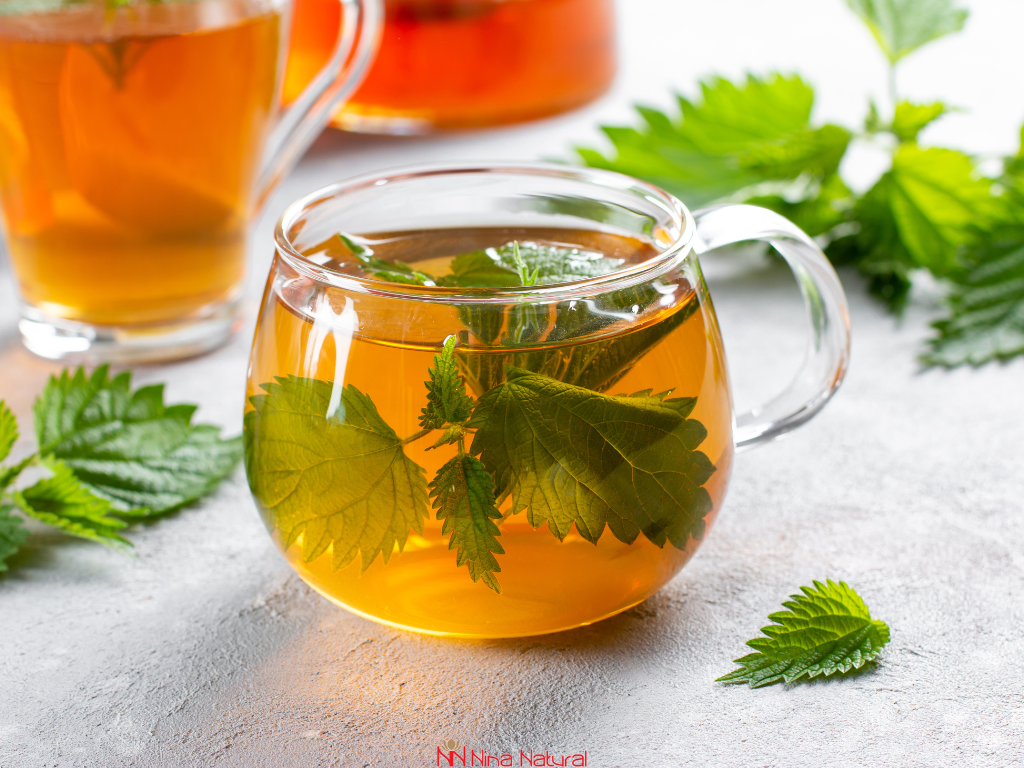
What to pay attention to when choosing nettle shampoos
- Composition (INCI list): Nettle should be listed as Urtica dioica extract (leaf/root) among the first ingredients, not at the very end of the list. If nettle is only in traces (after perfume or preservatives), the effect is minimal.
- Form of nettle:
- Leaf extract – most common, good for oily scalp and dandruff
- Root extract – more often used in supplements, but sometimes in lotions
- Best are standardized extracts (stated in mg or % of active substances)
- Added active ingredients: Combination of nettle with other ingredients can improve effect:
- Zinc, panthenol, caffeine – for follicle strengthening
- Birch tar or salicylic acid – for dandruff and oily scalp
- Biotin, keratin, B complex vitamins – for hair structure support
- Hair and scalp type:
- If you have oily scalp – choose nettle shampoo without silicones and oils
- If hair is dry or thin – look for combination with mild hydrating ingredients (aloe vera, glycerin)
- If dandruff is the problem – best if shampoo also contains antifungal active substances (e.g., climbazole, piroctone olamine)
- Realistic expectations: Nettle shampoos can help with oil regulation, root strengthening, and dandruff reduction. Hair growth won’t be dramatic from shampoo alone – this requires a combination of nutrition, supplementation, and lotions/tonics that are left on the scalp (since shampoo is rinsed off quickly).
For whom is nettle in hair care most beneficial?
For people with mild to moderate hair loss
Laboratory studies have shown that nettle extract can stimulate hair follicles, extend the growth phase, and reduce the shedding phase.
A clinical study on 120 participants with mild to moderate hair loss showed significant reduction in hair loss among those who used shampoo and serum with nettle extract compared to the placebo group.
This practically means benefits can be noticed if we’ve established through medical examination that hair loss isn’t just a consequence of hormonal imbalance, fungal diseases, or vitamin and/or mineral deficiency.
People with oily hair
Nettle contains natural components like tannins and flavonoids. Tannins are known for their astringent effect, while flavonoids have antioxidant and anti-inflammatory properties. These components temporarily narrow pores on the scalp, reducing excessive sebum secretion.
In practice, this means that with regular use of quality shampoos or tonics, hair would get oily less often, if we’ve established through medical examination that oily hair isn’t just a consequence of hormonal imbalance or vitamin and/or mineral deficiency.
People dealing with dandruff and scalp irritation
Thanks to its anti-inflammatory and antibacterial properties, nettle soothes inflamed and irritated scalp. It can reduce itching and dandruff, creating a healthier environment for hair growth.
However, one should be cautious when choosing therapy without medical advice.
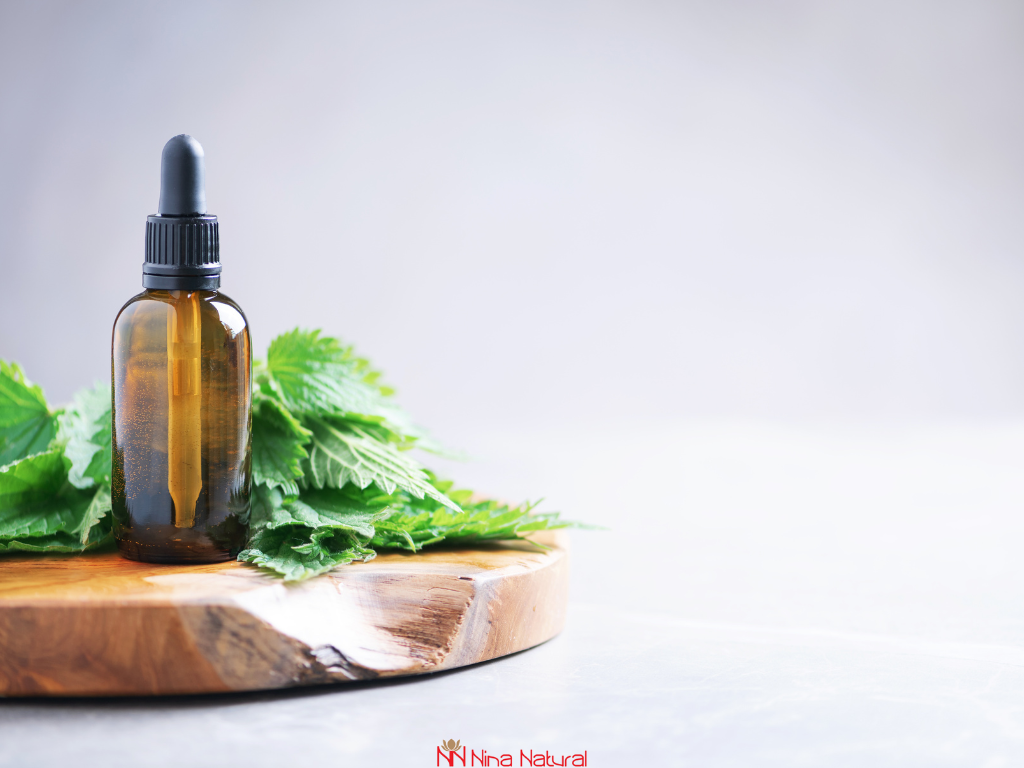
Short-term and long-term effects of nettle in hair care
Short-term effects
For example, after just a few applications of shampoo and tea, the following benefits have been recorded:
Softer hair: thanks to vitamins and minerals, strands gain elasticity and natural smoothness.
Less oiliness: rinsing with tea or using nettle shampoo reduces excessive sebum secretion, so hair stays clean longer.
Natural shine: active substances from nettle restore the surface layer of hair strands, making hair look healthier and brighter.
Long-term effects
With regular and consistent use of shampoos, macerates, oils, or tea for hair rinsing (at least 2–3 months), the following results have been recorded:
Stronger hair follicles: by stimulating scalp circulation and enriching roots with nutrients, hair becomes more resistant and less prone to damage.
Reduced shedding: especially with mild or seasonal shedding, nettle can contribute to reducing hair loss.
Potentially thicker hair: in people with weaker, thin hair strands, regular application can encourage the appearance of new, fine hairs, making hair appear fuller.
Nettle in combination with other plants for hair care
Nettle + rosemary – for growth stimulation
Rosemary is known for stimulating scalp circulation and encouraging new hair growth. When combined with nettle (in tea or tincture form), the follicle-strengthening effect is more pronounced. This mixture is suitable for people who want thicker and stronger hair.
Nettle + chamomile – for calm scalp and natural shine
Chamomile works soothingly and against irritations, while nettle strengthens and cleanses the scalp. Together they make an ideal combination for sensitive scalp and normal hair that needs brilliant shine. Chamomile also gently lightens hair, so it’s suitable for lighter shades.
Nettle + burdock – for detoxification and strengthening
Burdock is known as a plant that cleanses the scalp and helps with dandruff and seborrhea. Combined with nettle, it contributes to scalp detoxification, strengthens hair, and reduces tendency to breakage. This combination is especially useful for oily scalp and thin hair.
Nettle + lavender – for balance and relaxation
Lavender has antibacterial and soothing properties, and its scent additionally provides a sense of relaxation. When mixed with nettle tea or oil, it helps calm irritated scalp and stress, which often affects hair quality.
Nettle + immortelle – for regeneration and healthy growth
Immortelle works regeneratively, soothes irritations, and helps scalp renewal. Combined, these two plants simultaneously strengthen roots and promote healthy growth, while also providing additional care for sensitive scalp. They’re especially useful for thin, brittle hair prone to shedding, with occasional problems with dry or irritated scalp.
This is one of the reasons why nettle is one of the basic ingredients in Nina Natural All in One hair oil.
Nina Natural All-In-One Hair Oil – Immortelle, Argan, Nettle
30 ml Immortelle Oil, Argan Oil Jojoba Oil, Tea Tree Oil Coconut Oil, Orange Essential Oil Vitamin E, Panthenol Nettle Extract Regeneration of Damaged and Colored Hair Scalp Protection and Microflora Balancing Hydration and Protection from Drying Maintaining Shine and Softness Hair Growth Support
Risks and precautions:
Irritations: With sensitive skin, concentrated extracts may cause mild irritation. Therefore, a patch test and medical consultation are always recommended.
Oral use: Consumption of nettle tea or supplements can affect the action of some medications (anticoagulants, diuretics, diabetes medications). Everyone should avoid oral supplement use without medical advice.
Conclusion
Nettle isn’t a miraculous and quick solution for beautiful and healthy hair, but its vitamins, minerals, and antioxidants can significantly contribute to scalp and follicle health.
Regular and proper use – whether through tea, tonic, shampoo, or combination with other plants – can improve circulation, reduce inflammation, and give hair a stronger, healthier appearance.
Scientific evidence confirms its potential, but emphasizes that effects aren’t quick nor guaranteed for everyone because some hair problems have deeper causes.
For visible results, consistency and time are needed, as well as understanding that genetics, hormones, and overall health play a key role in hair quality and fullness.

